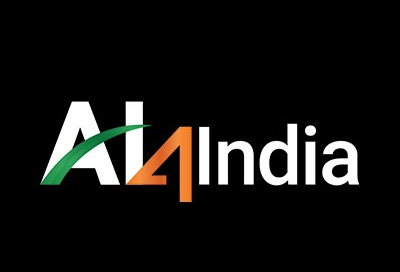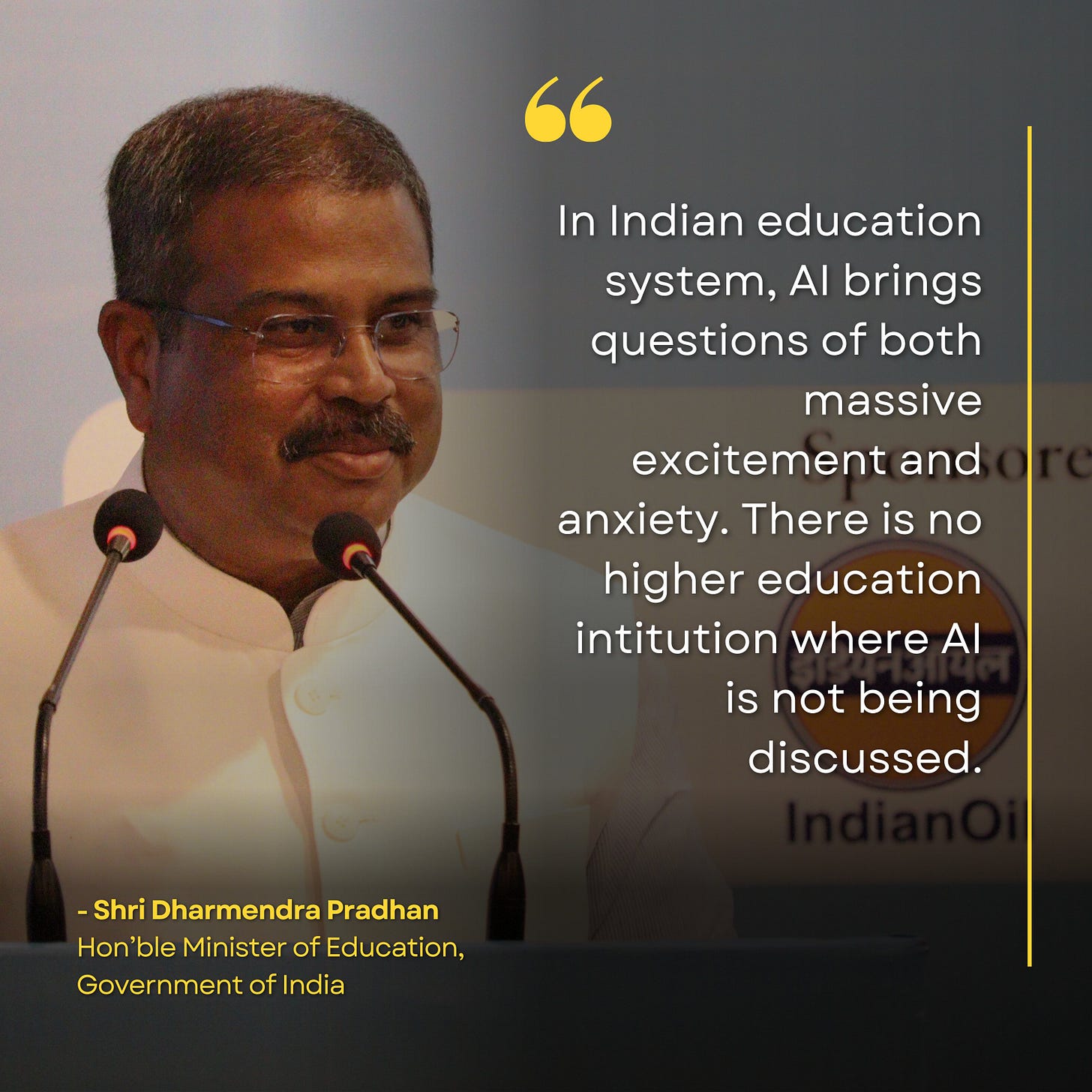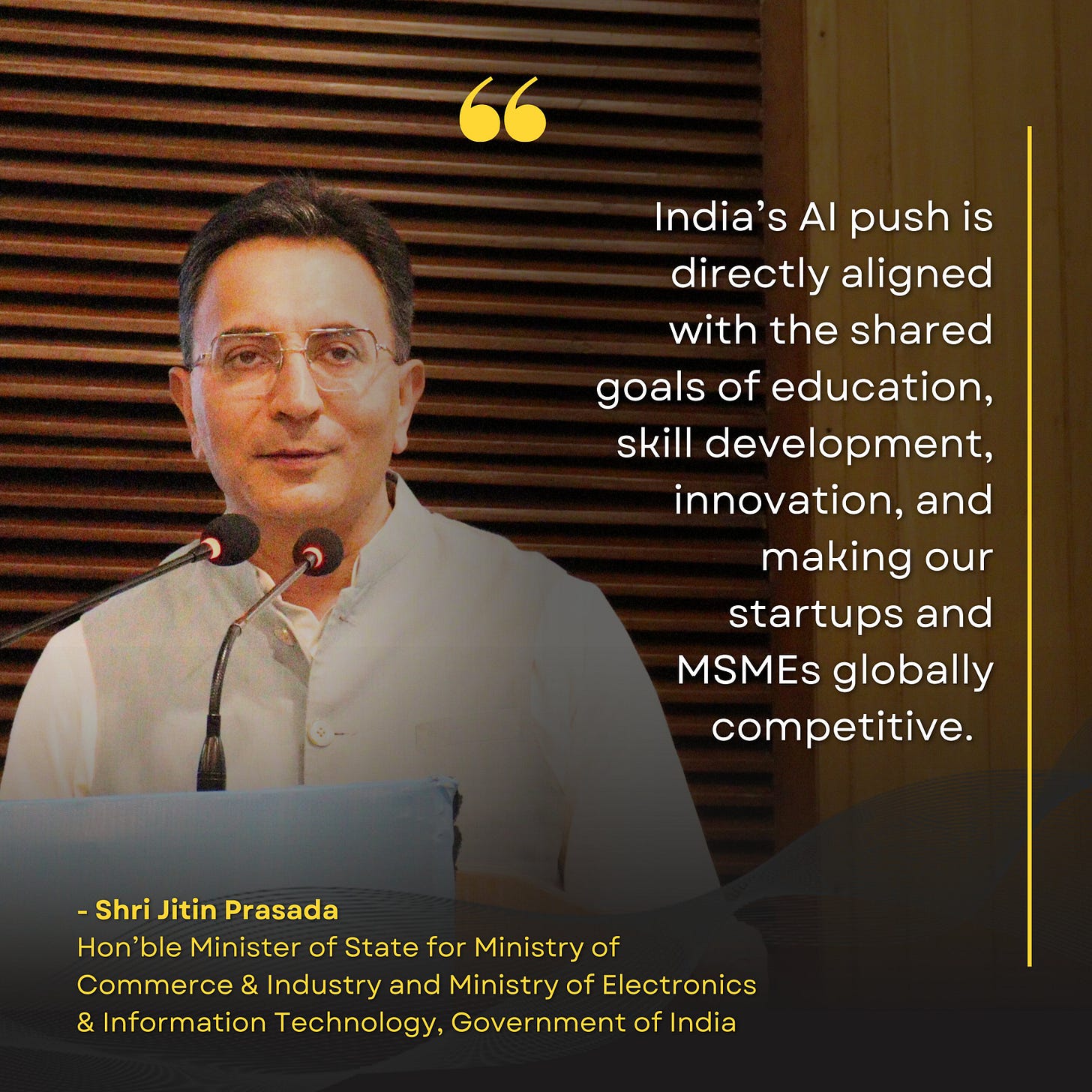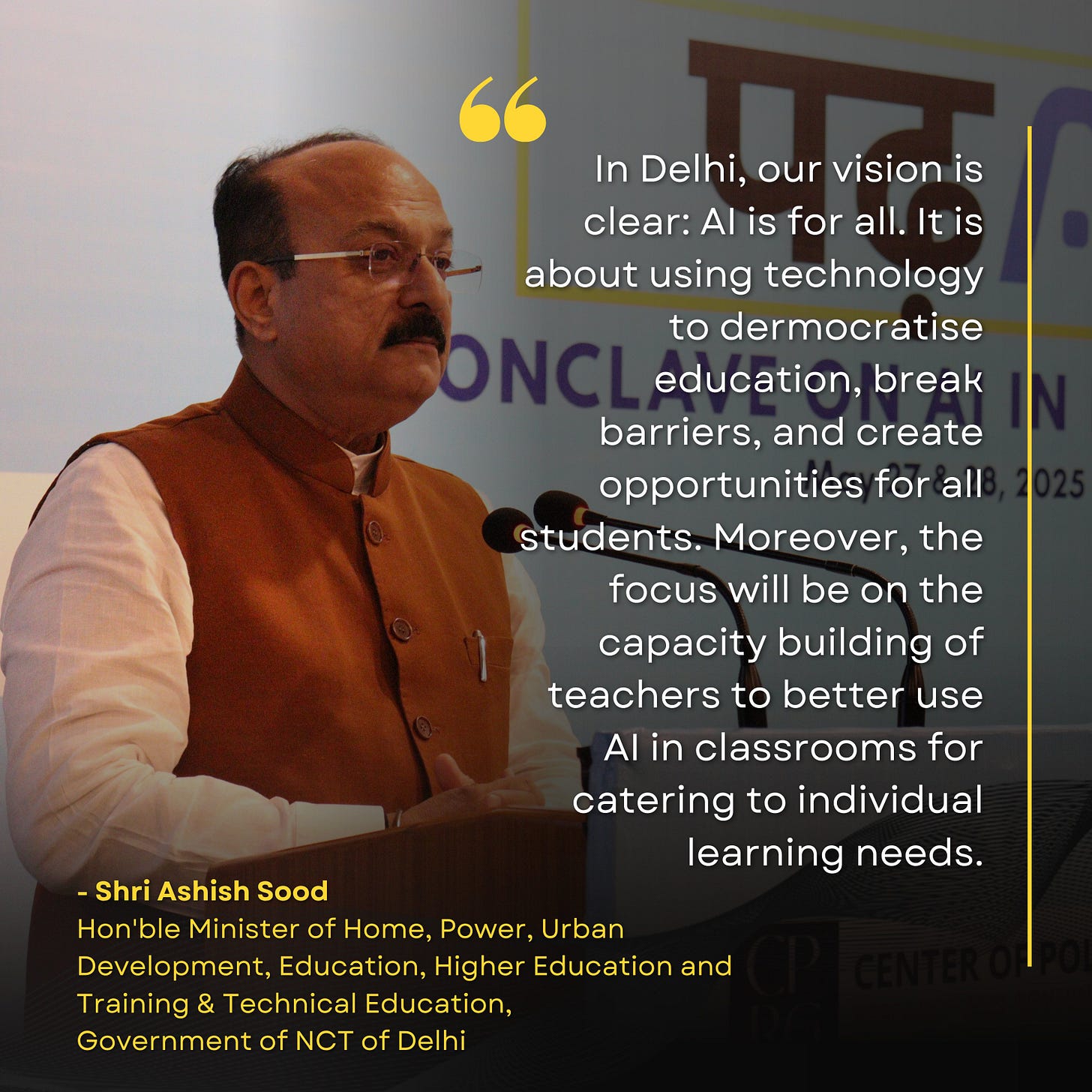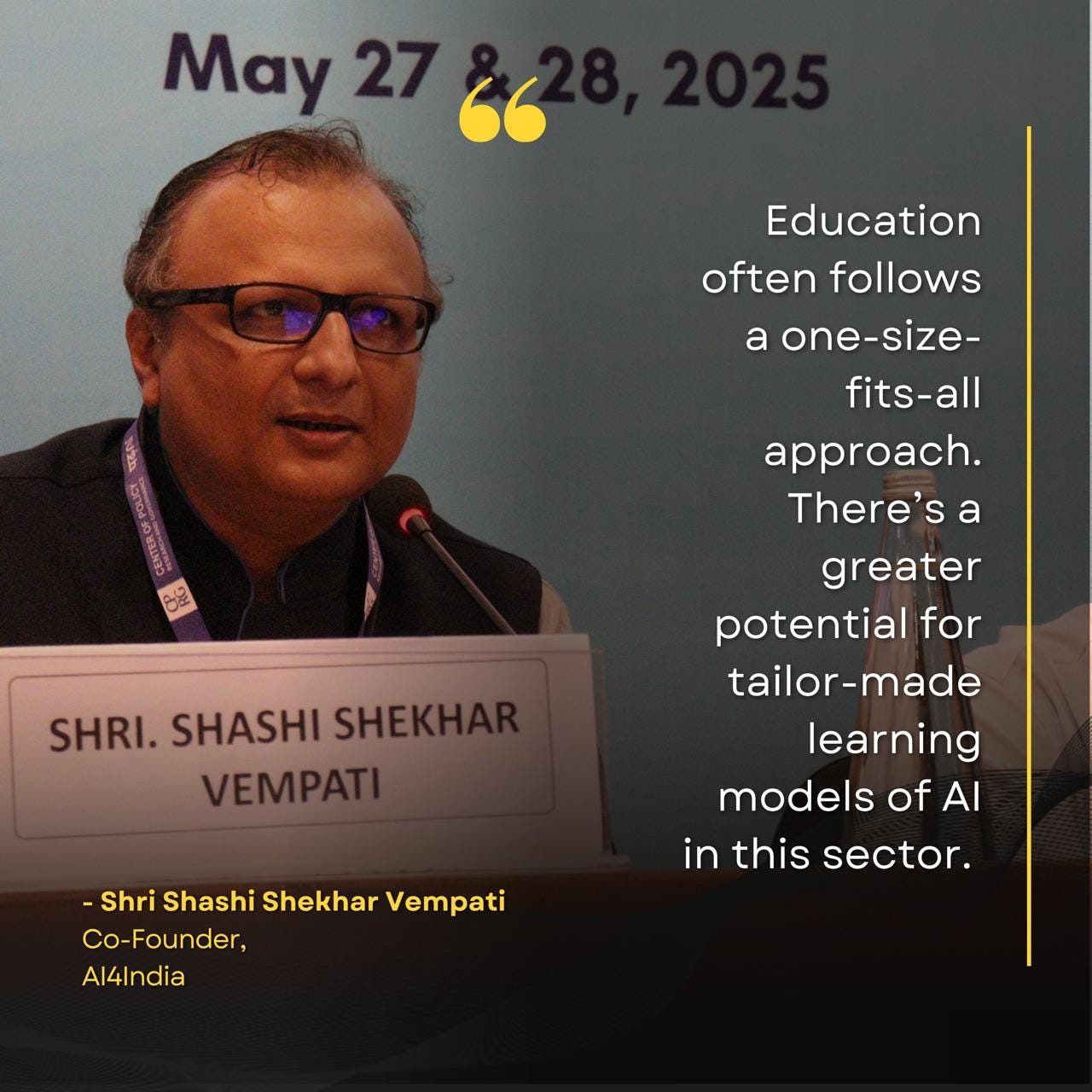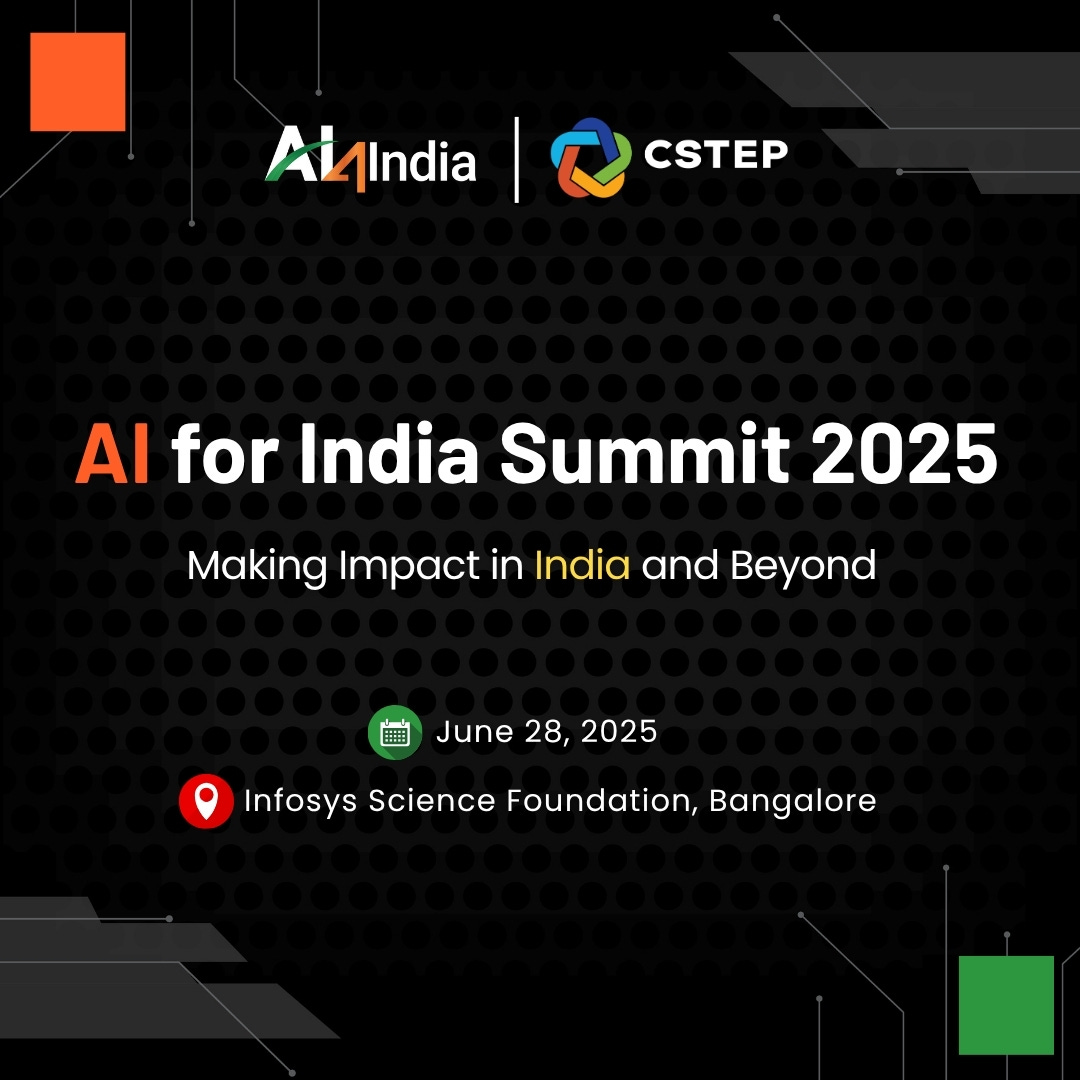As India takes bold steps toward integrating AI across sectors, the conversation around ethical, impactful, and inclusive innovation is gathering momentum. This week’s edition covers key developments shaping that vision—from the पढ़AI Conclave that reimagined the future of education, to the BharatGen consortium’s launch of Param 1, a bilingual LLM built for India. We also spotlight Shashi Shekhar Vempati’s insights on building localised AI, preview the upcoming AI for India Summit in Bangalore, and reflect on a year of AI evolution through our guest column feature by Omkar Patil.
Redefining Education: Highlights from the पढ़AI Conclave
The पढ़AI: Conclave on AI in Education, held on 27–28 May 2025 in New Delhi and organised by the Centre for Policy Research and Governance (CPRG), convened a diverse group of leaders, educators, and innovators to examine how AI is reshaping the future of Indian education—from classrooms to campuses, policies to platforms.
Delivering the valedictory address, Union Education Minister Shri Dharmendra Pradhan described AI as a “force multiplier” and “a bridge between empathy and technology,” emphasizing its role as a catalyst for inclusive innovation. He noted that the time has come for the country’s human intelligence to lead the AI revolution, and underlined key government efforts such as the establishment of Centres of Excellence in AI, and the promotion of Indian language AI tools to enhance classroom engagement. “Integrating AI into school education is no longer optional—it is essential,” he stated.
Earlier, Shri Jitin Prasada, Minister of State for Commerce & Industry, and Electronics & IT, set the tone with a keynote address that strongly echoed the theme of inclusivity. “Our government's intent is very clear: AI is for all. It cuts across government and society,” he affirmed. “We must ensure India leads not just in talent, but in conscience and compassion,” he added.
Delhi Education Minister Shri Ashish Sood focused on striking the right balance between human values and emerging technologies. “AI should augment, not replace, the human element in classrooms,” he said. “Our vision for Delhi is AI for all—it’s about breaking barriers and creating equitable opportunities for every student.”
Shashi Shekhar Vempati, Co-founder of AI4India, participated in a panel discussion titled “Redefining Higher Education through AI” alongside Abhishek Singh, Additional Secretary, MeitY; Dr. Pramath Raj Sinha, Founder of Ashoka University; and Prof. Badri Narayan, Director, GB Pant Social Science Institute. Moderated by Madhuparna Das, Associate Editor (Policy), CNN-News18, the session explored how AI can transform not just what we learn, but how we learn.
Shashi spoke about the promise of AI in scaling high-quality educational content across multiple Indian languages, while advocating for platforms that adapt to individual learning journeys. He made a strong pitch for democratising access to high-quality datasets, urging institutions and individuals to contribute toward building India-specific AI solutions. “If we want truly inclusive and context-aware AI in education, we need to build it together—from the ground up,” he said.
The conclave featured several other notable voices including Dr. Vineet Joshi, Prof. Anil Sahasrabudhe, Prof. Yogesh Singh, Sanjeev Bikhchandani, and Dr. Rashmi Das, all of whom reiterated the need for collaborative innovation and policy action to ensure AI becomes a tool of empowerment—not exclusion.
Podcast Spotlight: Building Ethical, Localised AI for India
In the latest episode of the AI4India Podcast, Shashi Shekhar Vempati, Co-founder of AI4India, dives deep into the foundational goals behind the AI4India initiative and the urgent need for AI that reflects Indian languages, values, and contexts. He revisits India’s early engagement with AI policy, the gaps in western-trained models, and how India's unique linguistic and social diversity calls for a different, decentralised approach to AI development.
Shashi also discusses the importance of public datasets, accessible compute infrastructure, and ethical AI practices—highlighting the AI4India campaign #DataDaan as a model for voluntary data contribution. “We don’t need a $20-a-month AI subscription,” he says. “We need AI at the edge, on the phone, in Indian languages—empowering the last mile.”
Watch the full video below!
Coming Up: AI for India Summit 2025 – Bridging Innovation and Impact
While AI continues to dominate global headlines with massive investments and sky-high expectations, real industry adoption in India remains limited. Many businesses are unsure which AI use cases are ready for deployment, and startups often find themselves stuck at the PoC stage, struggling to scale.
To address this gap, AI4India, in collaboration with the Center for Study of Science, Technology and Policy (CSTEP), is hosting the AI for India Summit 2025 – Making Impact in India and Beyond on June 28, 2025, at the Infosys Science Foundation, Bangalore. The summit aims to bring together industry leaders, deep tech startups, academics, and policymakers for focused conversations that can unlock adoption and collaboration.
Startups working in AI and DeepTech can apply to attend via this form.
Admission is free but limited. Applications close on June 2, 2025.
Shortlisted startups will be invited by the organisers.
Param 1: BharatGen's Bilingual LLM Pushes Indic Frontier
In a major stride for sovereign AI development, the BharatGen consortium—featuring IIT Bombay, IIT Kanpur, IIT Mandi, IIT Madras, IIT Hyderabad, IIIT Hyderabad, and IIM Indore—has launched Param 1, a 2.9 billion parameter bilingual large language model (LLM) that includes 25% Indic data, a stark leap from the 0.01% seen in models like Meta’s Llama.
Now hosted on AIKosha, MeitY’s official AI innovation platform, Param 1 lowers a critical barrier for developers: pre-training. “Pre-training is an enormous undertaking and often an insurmountable barrier for many. That’s why we’ve taken on this challenge,” said the BharatGen team. Developers can now fine-tune Param 1 to create Indic-focused chatbots, copilots, and knowledge systems tailored to Indian needs.
In parallel, the team has released 20 speech models in 19 Indian languages, including Speaker Adaptive TTS, Speaker-Conditioned TTS, and Voicebox TTS models, enabling high-fidelity speech generation in languages like Hindi, Tamil, Marathi, Telugu, and Bengali.
“Our goal is not just to build AI models but to provide resources that startups and system integrators can leverage,” said Prof. Ganesh Ramakrishnan of BharatGen.
Guest Column - One Year On: Revisiting the State of AI and Looking Ahead
In his reflective piece, Omkar Patil looks back at the key shifts that shaped India’s AI landscape over the past year and lays out the road ahead—where ethical development, ecosystem collaboration, and homegrown innovation will be key drivers.
🔗 Read the full article here: bit.ly/OneYearAI
#DataDaan - Donate for a Digital India
Aligned with the IndiaAI Mission and MeitY’s efforts to ensure the availability of AI-usable data, the #DataDaan campaign by AI4India is now live on DataDaan.org. This initiative invites individuals and organizations to contribute valuable datasets, enriching India’s AI ecosystem and driving innovation across sectors. The platform provides a streamlined process for data contribution, ensuring responsible and impactful AI development. Visit DataDaan.org to explore the initiative and be part of this transformative effort.
NOTE: The views expressed by the authors are their own. AI4India as a forum does not endorse any comments on specific brands, products, platforms or companies.
Join our AI4India.org forum to be a part of the AI revolution in India by visiting our site now.
Follow us on our X and LinkedIn to receive interesting updates and analysis of AI-related news

